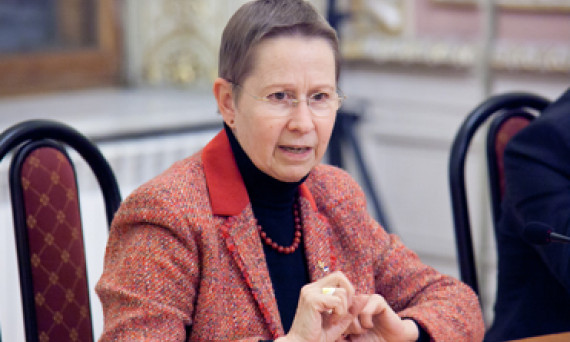The visit was part of the delegation from Lower Saxony’s official activities in St. Petersburg. The German colleagues met with city administrators, visited leading universities, and in the evening attended a reception at the Astoria Hotel organized by Prime Minister of Lower Saxony Stephan Weil. As part of these events a memorandum on cooperation was signed between the European University at St. Petersburg and the University of Göttingen.
Before the memorandum was signed professor Beisiegel presented in the EUSP’s Gold Hall to members of the academic council. She spoke on the problem of plagiarism in science and ways of counteracting it in Germany.
Plagiarism is one of the most serious problems in scientific research, on par with the falsification of data. Falsification does not always imply the use of fully erroneous data—sometimes it can refer to data that are not sufficiently correct and clean (this is especially common among young researchers.)
These phenomena can be fought by educating and training both students and teachers on how to conduct research. It is necessary to explain what constitutes plagiarism and to resolve these issues not just at the national level, but within universities and university departments as well. The fight against plagiarism is both methodological (how to prepare data) and ethical (what does it mean to be honest within the sciences?) In Germany each university that receives funding from the German Research Foundation (DFG) must have its own standards for scientific research and publication guidelines. These standards, unlike codes of academic integrity, must be spelled out in sufficient detail.
After a short presentation, Professor Beisiegel answered questions from the audience.
-Are there differences in plagiarism between the natural and social sciences?
In general, plagiarism and falsification of data are more widespread in the social sciences due to the fact that the social sciences use greater amounts of data for analysis. In the humanities high levels of self-citation are normal, unlike in other sciences. In rapidly developing fields such as biomedicine, research must be conducted and published as soon as possible, resulting in data that are often not very clean. Thus, one way of combating data falsification is to emphasize quality rather than speed and amount of data collected.
-What are some reasons for plagiarism?
One of the most significant factors in recent times has been the use of computers. The possibility of mindless copying (copy-paste) from ready-made electronic sources has had a strong influence on the culture of writing scientific texts, and many student essays, which are frequently not checked for plagiarism, are written in this way.
-How can we resolve scientific conflicts concerning plagiarism?
In Germany there is an institute of scientific ombudsmen. Each research institution has an ombudsman who mediates when conflicts regarding plagiarism arise. This often solves the problem, as plagiarism does not always occur at the behest of researchers, but may be accidental or the result of negligence. Conflict resolution has a cascading character: first the ombudsman tries to resolve the conflict, then it is passed to a special committee, and only after this can a decision be made about dismissal. Academic penalties can include not only dismissal, but also a ban on receiving research grants for several years.
Oleg Kharkhordin remembered a time when one research group graduate student was charged with deliberate plagiarism, and his supervisor only of negligence. In Beisiegel’s view, such cases are some of the most complicated. Firstly, a supervisor may have a different number of researchers accountable to him, and as a result cannot always carry a fixed share of the responsibility for his charges. Secondly, in China, for example, the notion of plagiarism is very different from in the West. In other words, what is considered plagiarism in the West is not the same as what is considered plagiarism in China. Students coming from China have a different academic culture.
In her conclusion Professor Beisiegel noted that the culture of citation and, accordingly, plagiarism was different fifty years ago from what it is now and is gradually changing. Perhaps in the future our understanding of these phenomena will change as well.












